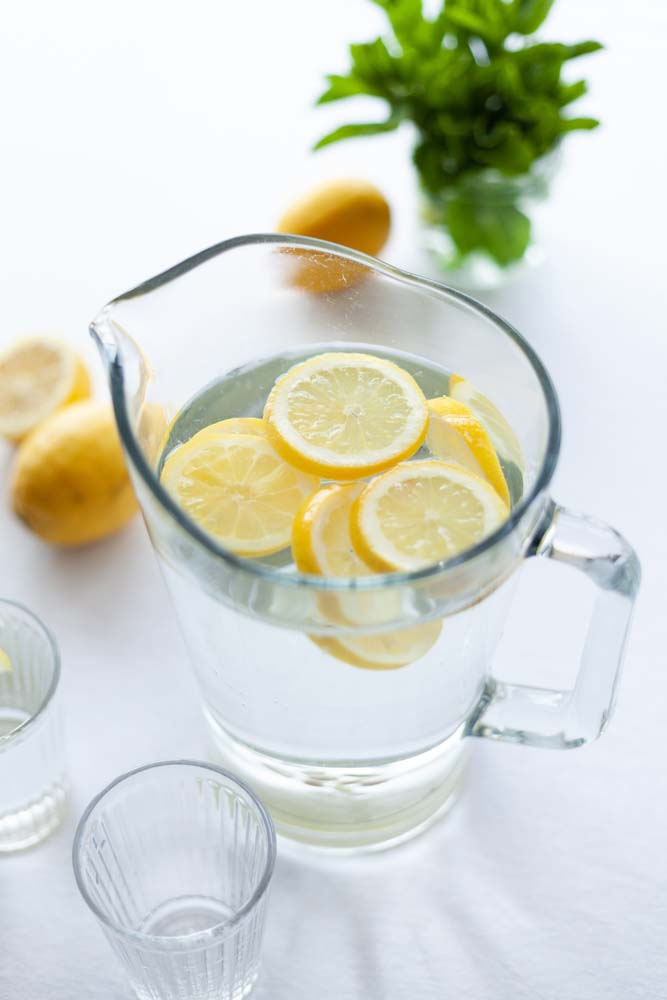
10 Top Habits to Beat the Belly Bloat
1. Reduce Sugar, salt and avoid processed foods
Eat simple and eat whole foods. Steer clear of processed foods that are loaded with sugar, salt, artificial colours, preservatives, and sweeteners. Our body stores this as fat around the belly area! Which we certainly don’t want. Another prime culprit of bloat is eating or drinking too much salt so be mindful of your salt intake.
Furthermore, sorbitol and fructose are sugars commonly found in processed foods. Our bodies have trouble digesting these sugars, which can then cause gastrointestinal distress like bloating. Getting natural sugars from fruits and vegetables is the way nature intended us to eat. Try increasing your vegetable intake so half your plate is made up of veggies (Lacy and Gabbard et al 2011).
2. Understand if you have any food intolerances? And be mindful of your triggers.
If you have a food intolerance it means you can experience adverse reactions to certain foods. Food allergies and intolerances are common causes of bloating. Common offenders include lactose, fructose, wheat, gluten, and eggs. If you suspect you may have an intolerance, it’s important you get a proper diagnosis from a health practitioner as cutting out food groups from your diet without help from a professional could mean you miss out on important nutrients your body needs.
Certain foods may trigger your bloating, and this can vary from person to person. A good idea is to keep a food diary for a week and note down how you feel after eating. Doing this will help you understand which foods trigger your bloating. (Hunt and Quigley et al 2014).
3. Eat slowly, chew properly, and avoid drinking from a straw
Digestion begins in the mouth. Eating too quickly can disrupt your stomach, because the enzymes in your digestive system do not have enough time to break down the food properly. Plus, quick eating can cause air swallowing that results in bloat. You’re actually supposed to chew your food about 30 times per bite, so that it’s mostly broken down before you even swallow. Most of us only chew an average of 5-10 times per bite. Avoid using straws when you drink as this can cause you to suck in more air.
4. Eat fibre rich foods to reduce constipation
The fibre in plant foods is essential for having regular bowel movements and preventing constipation, which may cause bloating. If you increase your fibre intake do it gradually and remember to increase your water intake to help keep things moving in the gut area. It’s about finding the right amount of fibre that works for you and your gut.
5. Reduce stress and sleep more
A lack of sleep which can be common especially during perimenopause and menopause affects us in so many ways. When we do not get enough sleep, our bodies release a stress hormone called cortisol, which disturbs our digestive system causing things like bloating and constipation. A lack of sleep also causes us to crave carbohydrates, which lead us to overeat and feel bloated. Lack of sleep can also lead to weight gain; we tend to overeat as we look for extra energy to get us through the day.
6. Use natural diuretics to help reduce water retention
Water retention is often a major player in belly bloating. Hormonal changes may cause extra belly bloating. Adding natural diuretics into your diet will help flush your system and reduce water retention. Be mindful of your salt intake as a lot of salt in your diet can cause water retention.

Natural diuretics e.g. A big glass of Lemon water in the mornings, parsley, drink 2 litres of water daily and make water your number one drink of choice, dandelion tea and eat potassium and magnesium rich foods
Magnesium rich foods:
- Leafy green vegetables
- Wholegrains
- Beans
- Nuts
- Fish
Potassium rich foods:
- Dried fruits (raisins, apricots) (Eat dried fruits in moderation as they are high in sugar)
- Beans & lentils
- Potatoes
- Winter squash (acorn, butternut)
- Spinach & broccoli
- Nuts
- Avocado
- Chicken & salmon
- Bananas
7. Look after your gut bacteria with probiotics
Your gastrointestinal tract contains over 500 bacterial species that work together to facilitate digestion and promote overall well-being, and if the balance of these bacteria is disrupted typically from things like medication use, stress, and poor diet you may notice it in the form of tummy trouble and bloating.
Probiotic foods and probiotic supplements can help improve the bacterial environment in the gut, which can help reduce symptoms of gas and bloating.
Probiotic foods
- Live culture yogurt is one of the best sources of probiotics, which are friendly bacteria that can improve your health
- Kefir – a fermented probiotic milk drink
- Sauerkraut
- Tempeh
- Kimchi
- Miso
- Kombucha
8. Think of your posture when eating
Having good posture, including sitting up straight while eating, results in a much smaller amount of gas being retained when compared to being hunched over or lying flat. Try focusing on your posture during mealtimes to prevent bloating.
9. Get Moving
Exercise may help reduce bloating by moving some of that built-up gas through your digestive tract. Less gas equals less bloating. Exercises that help strengthen the abdominal muscles are also super beneficial, and walking is also a great bloat buster.
10. Reduce alcohol intake
Drinking alcohol can affect our digestive processes and irritate our tummies which can lead to bloating.



